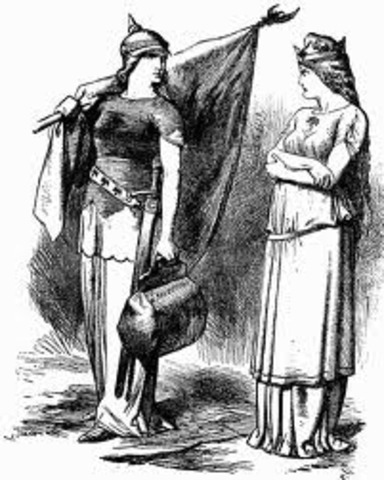The Reinsurance Treaty was a diplomatic agreement between the German Empire and the Russian Empire that was in effect from 1887 to 1890. Only a handful of top officials in Berlin and St. Petersburg knew of its existence since it was top secret.
It played a critical role in German Chancellor Otto von Bismarck’s extremely complex and intelligent network of alliances and agreements, which meant to keep the peace in Europe and to maintain Germany’s economic, diplomatic and political dominance.
The treaty allowed that both parties would continue neutral if the other became involved in a war with a third great power. However, if Germany attacked France or if Russia attacked Austria-Hungary, this treaty would not apply. Germany paid for Russian friendship by according to the Russian sphere of influence in Bulgaria and Eastern Rumelia (now part of southern Bulgaria) and by agreeing to support Russian action to keep the Black Sea as its preserve. After Germany declined to renew the treaty in 1890, the Franco-Russian Alliance of 1891-1892 to 1917 rapidly began to take shape.
Background of Reinsurance Treaty
The Reinsurance Treaty began after the German-Austrian-Russian Dreikaiserbund (League of the Three Emperors) had ended in 1887 because of competition between Austria-Hungary and Russia for spheres of influence in the Balkans.
In early 1887, a Russian diplomat went to Berlin to propose a treaty in which Russia would be a friendly neutral during a war between Germany and France, and in return, Germany would recognize Russian dominance in Bulgaria and promise friendly neutrality if Russia seized the Turkish Straits from the Ottoman Empire.
Bismarck strongly supported the idea, but Alexander rejected the plan until Foreign Minister Nikolay Girs assured him that to be best for Russia in the absence of French friendship. Bismarck rejected Russia’s request for Germany to stay neutral if Russia went to war against Austria and explained that Berlin had an ironclad Triple Alliance with Vienna.
Bismarck had a long-term policy of maintaining peace in Europe, which was approached by the growing competition between Russia and Austria–Hungary for dominance over the Balkans. He felt that an agreement with Russia was essential to prevent a Russian alliance with France, and he always had the policy of keeping France isolated diplomatically to avoid Germany from fighting a two-front war against both France and Russia. Bismarck endangered the expansion of the Russian sphere of influence toward the Mediterranean and diplomatic tensions with Vienna.
The treaty signed by Bismarck and Russian Foreign Minister Nikolay Girs had two parts:
- Germany and Russia agreed to observe benevolent neutrality if either become involved in a war with a third country. If Germany attacked France or if Russia attacked Austria-Hungary, that provision would not apply. In those cases, the important bilateral alliances could come into effect. The Reinsurance Treaty applied only if France or Austria-Hungary were the aggressors.
- In the most secret completion protocol, Germany would maintain neutrality if Russia intervened against the Ottoman control of the Bosphorus and the Dardanelles.
Nonrenewal
As part of Bismarck’s system of “periphery diversion”, the treaty was highly reliant on his prestige. After Kaiser Wilhelm II removed Bismarck from office in 1890, Russia asked for a renewal of the treaty, but Germany refused.
Bismarck’s successor, Leo von Caprivi, felt no need to appease Russia. German foreign policy establishment was united in rejecting a renewal because the treaty denied so many other German positions with regard to Austria, Britain, Romania, and Italy. For example, the Reinsurance Treaty opposed the secret treaty of 1883 in which Germany and Austria promised to protect Romania, and Russia knew nothing of that treaty.
Kaiser Wilhelm II, still highly influential in foreign policy, believed that his personal friendship with Tsar Alexander III would satisfy to ensure further genial diplomatic ties. His higher priority was to build better relationships with Britain. Anglo-Russian relations had long been strained by Russia’s quest to take control of the Turkish Straits, which link the Black Sea and the Mediterranean. Britain feared that Russian expansion to its south would threaten British colonial interests in the Middle East.
France, desperate for an ally, gave financial help to rebuild the Russian economy and successfully developed the Franco-Russian Alliance in 1894, which ended French isolation. The dismissal of Bismarck, the unpredictable temper of Wilhelm II, and the uncertain policy of the men who succeeded Bismarck were joint causes of growing international instability.
In 1896, the retired Bismarck caused a huge sensation by revealing the existence of the treaty to a German newspaper. He blamed his successor, Caprivi, as responsible for the nonrenewal in 1890. Bismarck said that the failure of the treaty made it possible for France and Russia to draw together.
Historians agree that the Reinsurance Treaty itself was not of great interest, but the failure to renew it marked the decisive turning point of Russia’s movement away from Germany and toward France and so was one of the Causes of World War I, which broke out in 1914.
>>>Read About Armistice of Salonica


